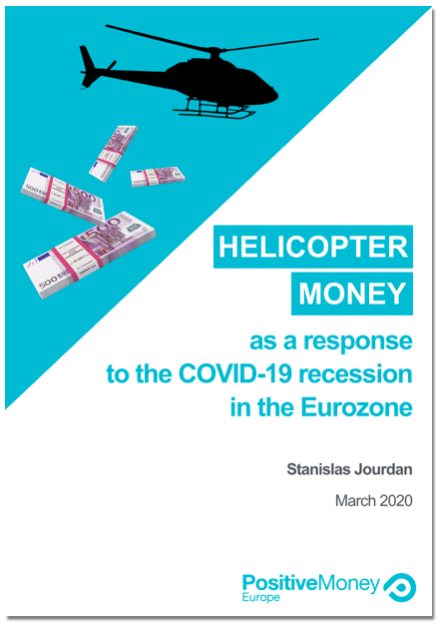New Report: Helicopter money as a response to the COVID-19 recession

As a new recession looms in the run-up of the Coronavirus crisis, Positive Money Europe’s newest report outlines why and how “helicopter money” should be deployed as soon as possible in the Eurozone.

The Coronavirus crisis only reached Europe a few weeks ago, but its effects on the economy are already certain to lead to an unprecedented recession. Hopefully, the health crisis will only be temporary, but its economic effects could be dramatic in the long term. In this context, the role of governments and central banks is to make sure that the temporary public health crisis does not turn into a long-lasting depression, which would see millions of people unemployed and would make the poor poorer.
While many people are losing their jobs and their incomes, proposals for “helicopter money” or universal basic income are making big headlines. The White House is already sending checks to all American households, and calls for “emergency basic income” are also attracting significant support from citizens.
Since 2015, Positive Money Europe has been campaigning for the ECB to implement helicopter money as a form of “QE for People”. Helicopter money is a policy under which the central bank creates money and sends it directly to the public, in the form of unilateral transfers to citizens, without debt. While helicopter money has long been a topic of theoretical academic debate, today’s crisis offers the ideal conditions for deploying it.

The paper aims to help policymakers carefully prepare for the practical implementation of helicopter money:
The EU’s economic response to the Covid-19 crisis focuses so far on reducing the damage. While necessary, these measures alone will not provide the unprecedented stimulus needed to kickstart the recovery after the public health crisis has been overcome;
In the current Eurozone macroeconomic and institutional framework, transfers to all citizens financed by the ECB would be the most effective and quick means of stimulating the economy;
Helicopter money would work by boosting consumption, preventing the accumulation of private arrears and non-performing loans debts, while limiting the additional public debt burden that would otherwise be incurred by the crisis;
Combined with other social transfers by national social security agencies, helicopter money would contribute to filling the gaps in the national welfare systems which the Coronavirus crisis has revealed, thus protecting the most vulnerable people;
A transfer of EUR 1000 to all Eurozone citizens would provide an immediate boost of at least 1.2% of GDP, without accounting for positive spillover effects and fiscal multipliers;
The ECB should pre-announce helicopter money as soon as possible, but only trigger the payments in the economic recovery phase. In the meantime, banks should be obliged to offer free-of-charge overdrafts to all customers, to the equivalent amount of the future ECB transfers;
While the EU Treaties would in principle permit the unilateral and autonomous implementation of helicopter money by the ECB, we argue that a politically coordinated approach with EU institutions and member states would greatly facilitate the deployment and effectiveness of the policy.



